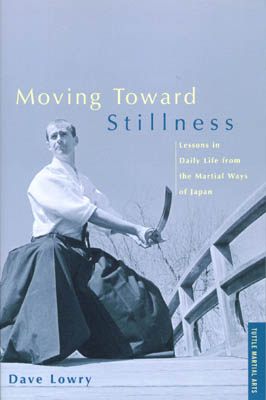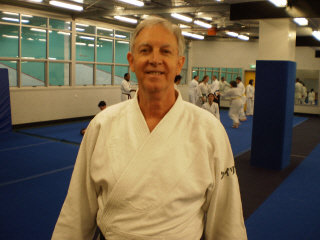Shukan News 18th April
Monday 18th April 2011
If you have any contribution for the Shukan News (story, photograph, video), please send it via email to gary@garyweigh.com
1. Classes over Easter
 Classes at Nathan dojo will be held as normal over Easter. There will be a class on Saturday 23rd April and there will be an evening class on Tuesday 26th which is a public holiday in lieu of Anzac Day on the 25th.
Classes at Nathan dojo will be held as normal over Easter. There will be a class on Saturday 23rd April and there will be an evening class on Tuesday 26th which is a public holiday in lieu of Anzac Day on the 25th.
There will be no classes at Everton Hills dojo over Easter as the PCYC will be closed. The classes affected will be the Saturday classes and the Monday evening class. All of our Everton Hills friends are welcome at Nathan dojo.
We wish you a HAPPY EASTER!
2. From the library
 ‘Moving Toward Stillness’ by Dave Lowry; p149-150, Chapter 36 Hiyameshi (“Cold Rice”)
‘Moving Toward Stillness’ by Dave Lowry; p149-150, Chapter 36 Hiyameshi (“Cold Rice”)
Finally, as we approach the stage of expertise where our teachers and seniors have no more to teach or to criticize, we might think the journey is nearing completion. Not so.
At this level the budoka is expected to turn inward, to relentlessly examine his technique and his whole lifestyle, searching out any weakness, imposing upon himself ever more hardship, seeking a level of the Way that is increasingly severe.
This austerity, known to all practitioners of the Ways of Japan, form the calligraphy to the budo to the tea ceremony, is called in Japanese, shugyo. But among budoka it is more colloquially known by an ironically descriptive term: they often call it hiya meshi o Michi, or “the Way of eating cold rice.”
If you do not prepare rice as a part of your regular diet, you may wonder at such an odd expression. The next time you have some leftover steamed rice in the refrigerator, give it a taste before you rewarm it or put it in the microwave. You will find the texture and consistency of the rice is, well, less than palatable.
It’s lousy in fact. It is tough, bitterly starchy, and unpleasant to chew, very different from fluffy, warm grains fresh from the pot. Soldiers in the field must eat their rice cold, because they lack the equipment or time to heat it. Bachelors who subsist on take-out dinners and wake up in the morning with nothing for breakfast but leftovers eat cold rice, too.
Sometimes, though, when circumstances dictate that a person must eat a bowl of cold rice, he will take it willingly. He may use a meal like that to remind him of the simple, humble things in life. A bowl of cold rice can serve to make a person appreciate that even the most blessed and fortunate among us must sometimes suffer.
Not every meal we eat can be tasty or hot or prepared exactly as we would like it. Despite its texture, cold rice is just as nutritious as rice that is fresh and hot. Eating cold rice can be a way of putting food in perspective. If we are hungry enough, cold rice can be satisfying, and it can provide us with the sustenance that we need even though it does not satisfy our tastes.
The austere practice of the budo is much the same. It is a discipline stripped of self-indulgence, of ego decorations. To follow a martial Way requires a certain amount of stoicism and an enduring spirit. The budoka prefers cold rice, so to speak, because he sees it is an essential means of improving himself, a means of perfecting his spirit.
It is not exactly accurate to say that the budoka “prefers” cold rice. More to the point, he accepts it, believing as he does that if he spends his life always looking for and demanding comfort and ease, he will never be tested, he’ll never be pushed to refine his body and spirit. The budoka accepts the hardships and austerity of cold rice because he feels that true contentment is not to be gained by acquiring things.
If you cannot be satisfied and happy unless you have hot rice with every meal (or a new car every year, or the latest fashions in clothing), you are apt to spend a whole lot of your life unsatisfied and unhappy, since most of us, having all these things is just not possible. But if you can find happiness in your rice whether it is hot or cold, chances are you will find the same contentment in everything life has to offer you.
The great budo masters of the past ate plenty of cold rice in their day. They suffered and endured. Their lives were not without happiness or good times or other luxuries. But none of them created lives that were centred on materialistic goals.
They chose a different path, a Way that means accepting some hardships. The late author Malcolm Muggeridge once said that of all the valuable lessons he learned in life he learned through suffering. Likewise it is hard to imagine that the great budo masters would ever have attained what they did without a stoic outlook.
Those of us who have elected to follow in the Ways they have left for us must come to our own conclusions about in what directions we want those ways to take us. Wherever we choose to go, however, if it is to be along the path of the budo, we must be prepared from time to time, to eat some cold rice.
This book is in our library. If you wish to buy this book, go to Amazon at
http://www.amazon.com/gp/search?index=books&linkCode=qs&keywords=0804831602
3. Michael Williams Sensei teaching at Goshinkan
 Don’t forget that Michael Williams Sensei will be teaching on Saturdays 14th May and 4th June, 10:30am – 12:30pm at Goshinkan Dojo, Byron Bay:
Don’t forget that Michael Williams Sensei will be teaching on Saturdays 14th May and 4th June, 10:30am – 12:30pm at Goshinkan Dojo, Byron Bay:
Admission fee for everyone is $15 / $12 (concession) applies.
After class there will be a little get-together over lunch at Belongil Beach Treehouse, or similar venue.
EVERYONE WELCOME!
4. Thought for the week
“As soon as you concern yourself with the ‘good’ and ‘bad’ of your fellows, you create an opening in your heart for maliciousness to enter. Testing, competing with, and criticizing others weaken and defeat you.” Morihei Ueshiba
